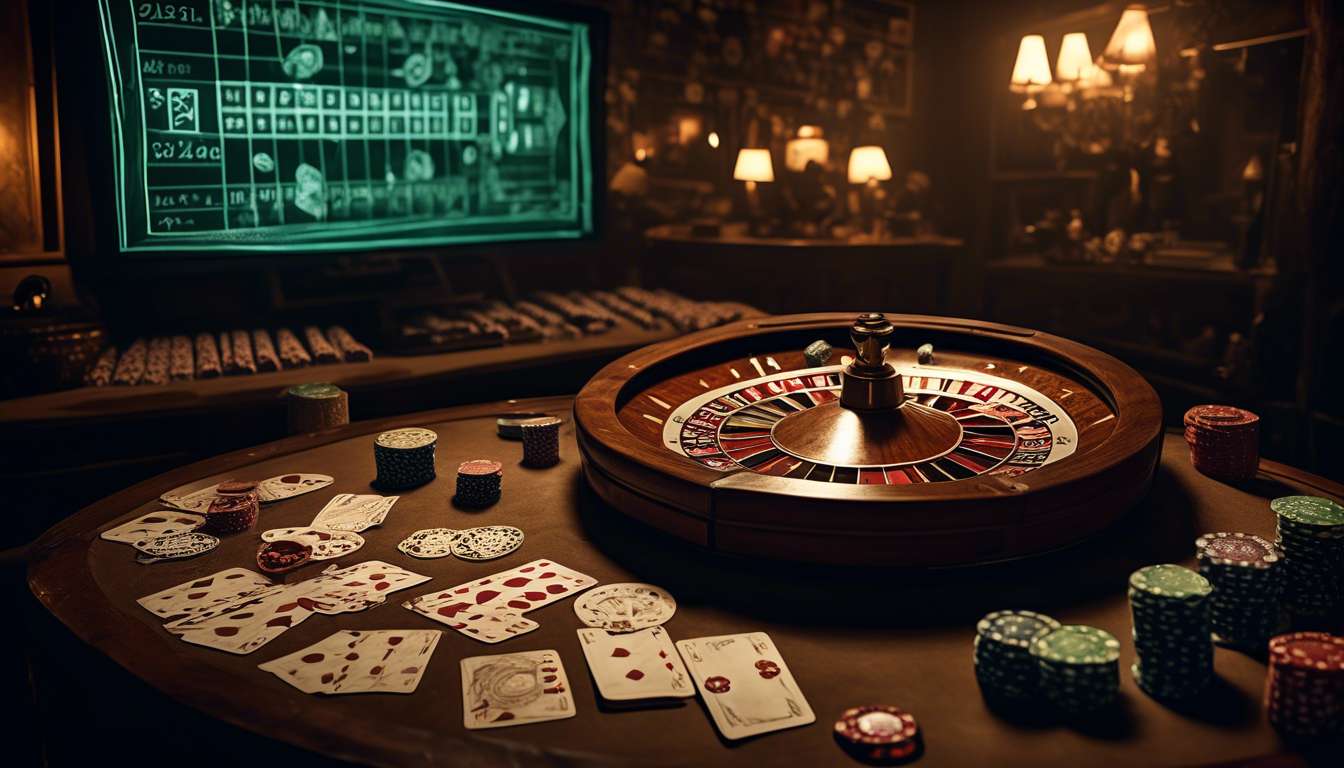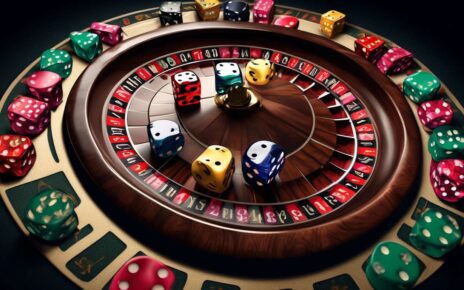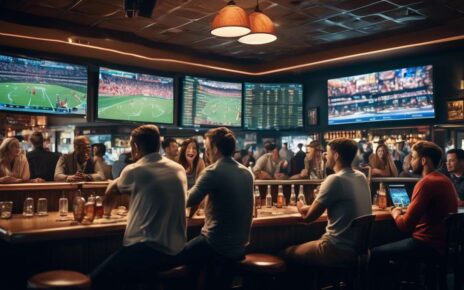We have all been there, caught up in the excitement of placing a bet, convinced by those all-too-common beliefs about betting odds. As enthusiasts and casual bettors alike, we find ourselves navigating a maze of assumptions that can often lead us astray.
In this article, we aim to debunk the myths that persist in the world of betting odds—myths that many of us have accepted as gospel truth. Whether we’re seasoned veterans or newcomers trying to make sense of the odds, it’s crucial to separate fact from fiction.
By examining these misconceptions, we can equip ourselves with the knowledge necessary to make more informed decisions and enhance our betting experiences.
Together, let’s explore these seven myths and uncover the realities that lie beneath, empowering us to approach our bets with a clearer understanding and a sharper edge.
Join us as we unravel the truths behind the odds we all believe.
The House Always Wins – Myth or Reality?
We’ve all heard the saying "the house always wins," but it’s important to dissect whether this is truly a myth or a reality in the world of betting. As part of our community, we share a curiosity about how bookmakers seem to have an edge.
The Bookmaker’s Edge:
Bookmakers rely on betting odds and probability to tilt the scales in their favor. They set odds not just to predict outcomes but to ensure a profit margin, known as the "overround."
How Bookmakers Ensure Profit:
- Setting Odds: Bookmakers create odds that reflect the probability of an event occurring.
- Adjusting Odds: They adjust these odds based on:
- The likelihood of an event.
- The betting patterns of the public.
- Balancing the Books: This adjustment strategy ensures bookmakers profit regardless of the event’s outcome.
By understanding the probability behind the odds, we can see how bookmakers aim to maintain control. The strategy they use keeps the house in charge, rather than relying on sheer luck.
So, while it may feel like a myth when we’re on a winning streak, the reality is that the odds are carefully crafted to favor the house.
Odds Never Change – True or False?
Many of us might think odds are set in stone, but they actually change frequently due to various factors. When we dive into the world of betting odds, we see that they’re dynamic, reflecting changes in probability as events unfold.
As members of this community, it’s crucial we understand how and why these shifts happen.
Bookmakers adjust odds to balance the money on both sides of a wager, ensuring they minimize their risk. If more people start betting on one outcome, that probability increases, prompting bookmakers to tweak the odds. These changes help keep the playing field even and maintain their profit margins.
External factors also influence odds. For instance, an injury to a key player or unexpected weather conditions can alter the perceived likelihood of an outcome, leading to odds recalibration.
By staying informed and understanding this fluidity, we can:
- Make better decisions
- Ensure we’re always part of the winning conversation in our betting community.
Higher Odds Mean a Sure Win?
Misconception About Higher Odds
Many of us might assume that higher odds guarantee a sure win, but this misconception can lead to disappointment. It’s crucial to understand what betting odds really mean.
Understanding Betting Odds
Bookmakers set odds to reflect the probability of an event’s outcome, not to promise a win. Here are some key points to consider:
- Higher odds indicate a lower probability of that outcome happening.
- The potential payout might be enticing, but it doesn’t mean the event is more likely to occur.
The Thrill and Community of Betting
We love the thrill of betting and the sense of community it brings. However, it’s important to approach it with a clear understanding:
- We are often drawn to the potential rewards of higher odds.
- It’s easy to believe that more significant risks will lead to certain wins, but this isn’t the case.
Bookmakers’ Strategy
- Bookmakers use their expertise to balance the odds, ensuring they maintain a profit margin.
By understanding these aspects, we can make more informed decisions and enjoy the camaraderie of betting without unrealistic expectations.
Odds Are Purely Based on Luck?
Many of us might think that luck solely determines betting odds, but this belief oversimplifies the intricate process behind setting them. As a community that values understanding and connection, let’s dive deeper into how these odds are really determined.
Bookmakers play a crucial role in crafting betting odds, and they don’t rely on luck alone. They analyze vast amounts of:
- Data
- Historical performance
- Current events
These elements help calculate the probability of various outcomes.
When we place our bets, we’re engaging with a system that’s been meticulously crafted to reflect these probabilities, not just a roll of the dice. Bookmakers use their expertise to adjust odds to ensure they:
- Balance their books
- Manage risk
This doesn’t mean luck has no place in betting—chance events can always surprise us—but it’s essential to recognize that probability and strategic analysis are core components of how odds are set.
By understanding this, we can better appreciate the complexity behind every number.
Understanding Odds Probability and Skill
We often underestimate how much skill and analysis go into interpreting odds and calculating probabilities. As a community eager to understand the intricacies of betting, we should recognize that betting odds aren’t just numbers. They’re a reflection of probability, shaped by the expertise of bookmakers who rely on data, trends, and insights.
When we look at betting odds, we’re not just seeing a potential payout; we’re seeing a calculated assessment of an event’s likelihood. Probability plays a critical role here. Bookmakers analyze vast amounts of information to determine these odds, factoring in:
- Statistics
- Player performance
- Weather conditions
By grasping the skill involved in setting and interpreting odds, we become part of a knowledgeable circle that values informed decisions over blind guesses. It’s empowering to know that with the right approach, we can enhance our understanding and make more strategic choices.
Let’s embrace the challenge and dive deeper into the world of betting odds and probability together.
Bookmakers Set Odds to Predict Outcomes
We often see odds as a bookmaker’s expert attempt to forecast the outcome of an event by analyzing a mix of data, trends, and expert insights. It’s easy to think that betting odds are precise reflections of probability, crafted by savvy bookmakers to predict outcomes with uncanny accuracy. However, we must remember that bookmakers aren’t just predicting—they’re balancing.
Bookmakers set odds not merely to predict, but to ensure they attract bets on all sides and secure profit regardless of the event’s result. Their aim is to create a balanced book where the stakes on each outcome are proportionate to the odds offered. This strategy mitigates risk and ensures their long-term success.
By understanding this, we can be part of a community that sees beyond the myth. We can appreciate that odds encompass more than just probability; they reflect a bookmaker’s need to safeguard their interests while engaging us in the thrill of the bet.
Let’s embrace this deeper insight and enjoy betting more wisely.
Betting on Underdogs Is Always Profitable?
Many of us have heard the tale that backing underdogs consistently yields profits, but this belief overlooks significant factors that affect outcomes.
Betting odds are more than just numbers; they reflect the probability of an event occurring, as calculated by bookmakers. When we see tempting odds for underdogs, it’s crucial to remember that these odds incorporate all known information, including:
- Team form
- Injuries
- Public sentiment
Bookmakers craft odds to balance their books and ensure a profit, not to offer us easy money. While betting on underdogs might sometimes feel like we’re part of an exclusive club rooting for the unexpected, it doesn’t guarantee a winning strategy.
The allure of high odds can cloud our judgment, leading us to ignore the true probability of an underdog’s success.
Instead of blindly betting on underdogs, let’s analyze each situation, considering factors beyond just the odds. By understanding the dynamics at play, we can make informed decisions and increase our chances of success.
Myth: Odds Can’t Be Manipulated
We’ve all heard the claim that odds are set in stone and can’t be influenced, but that’s not entirely true. In our betting community, we recognize that betting odds are a reflection of probability but also of the market’s collective behavior.
Bookmakers adjust odds based on various factors to manage their risk and ensure profitability. These factors include:
- Player injuries
- Weather conditions
- The amount of money being wagered on a particular outcome
When we place bets, we’re interacting with dynamic numbers. Bookmakers are constantly monitoring the action and can manipulate odds to:
- Balance their books
- Respond to new information
This means that odds can fluctuate, sometimes dramatically, right up until the event starts.
As a community of bettors, understanding this dynamic helps us make informed decisions. Recognizing that odds aren’t immutable gives us an edge, allowing us to seize opportunities when the market shifts in our favor.
How do betting odds differ between sports and events?
When it comes to various sports and events, betting odds can differ based on a range of factors. Each sport has its own unique dynamics and variables that influence how odds are set.
Factors Influencing Betting Odds:
- Player performance
- Team statistics
- Historical data
Understanding these differences can help us make more informed decisions when placing bets across different sports and events.
Can external factors, like weather or player injuries, influence betting odds?
External factors such as weather or player injuries can significantly impact betting odds. Bookmakers closely monitor these variables to adjust the odds accordingly.
For example:
- A key player being injured might lead to a shift in the odds favoring the opposing team.
- Adverse weather conditions can influence the outcome of a game, prompting adjustments in the betting lines.
It’s crucial to consider these external factors when placing bets.
How do bookmakers calculate the initial odds for an event?
We calculate the initial odds for an event based on a variety of factors.
Our team considers several key elements:
- Past performance
- Current form
- Head-to-head matchups
- Any other relevant statistics that may affect the outcome
By analyzing these data points, we aim to offer fair and accurate odds that reflect the probability of each possible outcome.
Our goal is to provide our community with a reliable and enjoyable betting experience.
Conclusion
In conclusion, debunking these common myths about betting odds can help you make more informed decisions.
Key Takeaways:
- Remember, the house doesn’t always win.
- Odds can change, and higher odds don’t guarantee a win.
By understanding probability and using your skills, you can navigate the world of betting with more confidence.
Misconceptions to Avoid:
- Don’t fall for the misconception that odds are purely luck-based or that they can’t be influenced.
Keep these truths in mind to improve your betting strategy and potentially increase your winnings.




